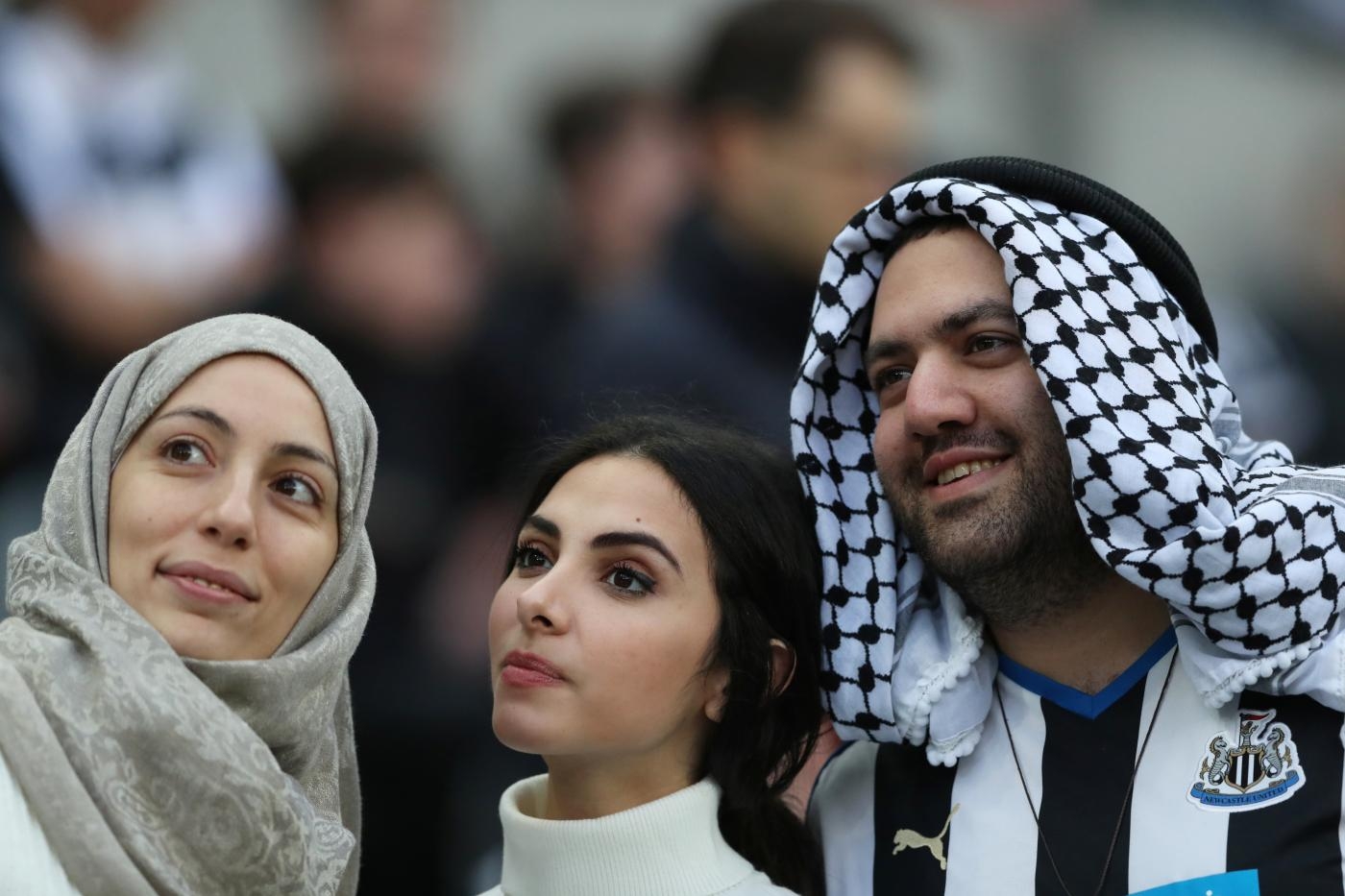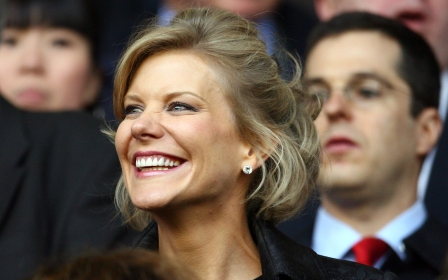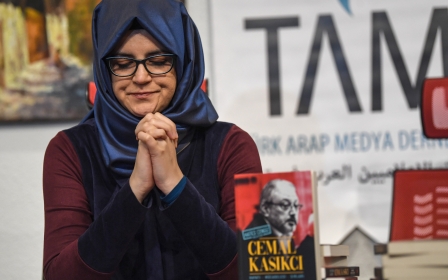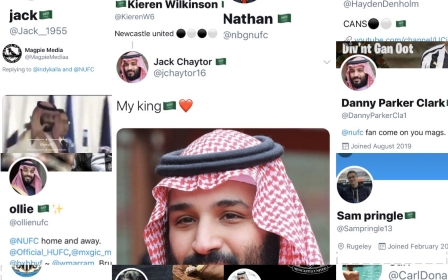Newcastle takeover: Fans from city's Arab community welcome Saudi bid's collapse

Newcastle United fans of Arab descent from South Shields, a town in northeast England with a long-established Yemeni and Muslim community, say they are “really pleased” that a proposed Saudi takeover of their football club had been called off, Middle East Eye has learned.
'I couldn't support a team owned by people openly taking out distant relatives that I'll never be able to speak to again'
- Robbie Parkin, third-generation Yemeni from South Shields
Descendents of some of the UK's earliest Arab and Muslim immigrants told MEE that the bid was "morally unacceptable" given Saudi Arabia's poor human rights record, and would have brought a "negative impact" on Tyneside's Muslims.
On 30 July, a consortium led by Saudi Arabia’s Public Investment Fund (PIF), which is chaired by Crown Prince Mohammed bin Salman, withdrew its £300m ($390m) bid to buy Newcastle United.
The PIF had waited over four months to pass the English Premier League’s (EPL) owners and directors’ test, but eventually lost patience after the vetting process was delayed by media piracy and human rights concerns.
The takeover proposal failed partly due to the EPL's demand that the Saudi state become a director of the football club for the deal to go through, according to a leading member of the investment group that was looking to buy the club.
New MEE newsletter: Jerusalem Dispatch
Sign up to get the latest insights and analysis on Israel-Palestine, alongside Turkey Unpacked and other MEE newsletters
Yemeni fans caught in crosshairs
The takeover has been a particularly hot topic in South Shields, a coastal town less than 10 miles away from Newcastle’s city centre. While many fans were bitterly disappointed by the bid collapse, others like Robbie Parkin held a different opinion.
“I’m really pleased the Saudis pulled out. When a power like that takes over, you sign a deal with the devil,” Parkin, a third generation Yemeni, told MEE.
“I haven’t really spoken to anybody who was really for the deal. Every person I spoke to, white, Yemeni or whatever, no one supported it on the shop floor,” he said.
Parkin, a 33-year-old football coach, is part of a small but significant number of South Shields residents who are of Yemeni descent.
'This club has a wonderful heritage… but Saudi Arabia was trying to use Newcastle to rescue its reputation as a pariah state with huge human rights abuses'
- Keith Hussein, South Shields resident
Yemeni men first arrived in South Shields as early as the 1860s, mainly working as seamen on British merchant vessels. Most of them married local women and integrated into wider Geordie culture, resulting in one of the UK’s earliest settled Arab and Muslim communities.
According to The Yemeni Project, there are now up to six generations of South Shields Yemenis, with many no longer having Arab names or features.
Parkin told MEE that despite never having been to Yemen, he had grave concerns about Saudi Arabia owning his boyhood football team, given its military involvement in his country of origin.
“During all the takeover talks, nothing was mentioned about how it would directly impact Yemen,” he said.
A Saudi-led coalition has carried out over 20,000 air attacks since the Yemeni civil war began in March 2015, with one-third of those striking non-military sites such as schools and hospitals, according to the Yemen Data Project.
“I couldn't support a team owned by people openly taking out distant relatives that I'll never be able to speak to again. I'd have rather gone and watched Sunderland play,” Parkin said, referring to Newcastle’s local Tyneside rivals.
MEE were in contact with other Yemenis from South Shields who had similar concerns about the takeover, but did not want to speak publicly due to fear of a backlash from local football fans.
South Shields Muslims ‘appalled’ at takeover
Keith Hussein, a South Shields resident of Egyptian descent, also welcomed the Saudi withdrawal.
“I have to say I’m really glad. This club has a wonderful heritage… but Saudi Arabia was trying to use Newcastle to rescue its reputation as a pariah state with huge human rights abuses,” he told MEE.
Hussein explained how his Egyptian father, Fahmy El-Rawy, served in the British Merchant Navy on the North Atlantic Convoy during World War Two.
After his ship was sunk in 1941, El-Rawy spent several years in a German prisoner of war camp. Once liberated in 1945, he settled in South Shields, where he married a local woman.
“Connections to the Merchant Navy is the main reason why a lot of Muslims from the Middle East came to settle in South Shields,” Hussein said.
The town’s main place of worship for Muslims, Al-Azhar Mosque, is thought to be the first purpose-built mosque in the UK. It was famously visited by Muhammad Ali in 1977, who had his marriage with Veronica Porche Ali blessed there.
“I managed to shake Ali’s hand,” Hussein recounted of his brief encounter with the boxing legend. “I was about 10 years old. It was just as he was coming out of the mosque, I snuck to the front of the crowd.”
The 54-year-old, who is now a researcher and lecturer, said that many of the town’s Muslims opposed the Saudi bid to own Newcastle United.
“I’ve spoken to friends in the Muslim and Yemeni community, and they were quite appalled at the thought of the consortium taking over Newcastle. I certainly think it would've been very negative for Tyneside’s Muslims,” Hussein said.
“It’s deeply morally unacceptable. You think of Saudi Arabia’s human rights abuses: the domestic population subjugated, dissidents and journalists assassinated, the ongoing war on Yemen - which is particularly unpopular here.
“The takeover would have divided Newcastle fans. Tyneside takes pride in good relations with the various Muslim communities, but I think this would have had a detrimental effect," he explained.
Takeover process criticised
Although some fans welcomed the collapse of the Saudi takeover, a large number of supporters were left angered and devastated by the news.
"As fans, we are heartbroken. It sounds dramatic but we have suffered for 13 years under (current club owner Mike) Ashley through a lack of interest and investment in the club,” Newcastle fan Michelle George told the BBC.
"The fact it played out how it did and for the length of time it did and then for the news to break, and we still don't have the full picture, it's left fans devastated," she said.
Following the decision, both #ThePremierLeagueIsCorrupt and #WeWantSaudi hashtags were trending on Twitter in the UK, with fans expressing their outrage at the outcome.
A petition calling on the UK government to launch an independent investigation into the EPL’s takeover process has received over 100,000 signatures. Prime Minister Boris Johnson heeded those calls on Sunday, when he urged the league to release a statement on why the Saudis withdrew and why the process took so long.
In addition, more than 6,000 Newcastle United fans lobbied their local members of parliament to put pressure on the EPL.
Among them was South Shields MP Emma Lewell-Buck, who demanded answers and greater transparency.
Lewell-Buck has spoken out in the past against the civil war in Yemen, and the UK’s role in selling arms to Saudi Arabia. It is unclear where she stands on the takeover attempt.
MEE asked the South Shields MP what her message was to Yemeni and Muslims constituents who had spoken out against Saudi involvement in their football club. She was unavailable for comment.
Middle East Eye delivers independent and unrivalled coverage and analysis of the Middle East, North Africa and beyond. To learn more about republishing this content and the associated fees, please fill out this form. More about MEE can be found here.




